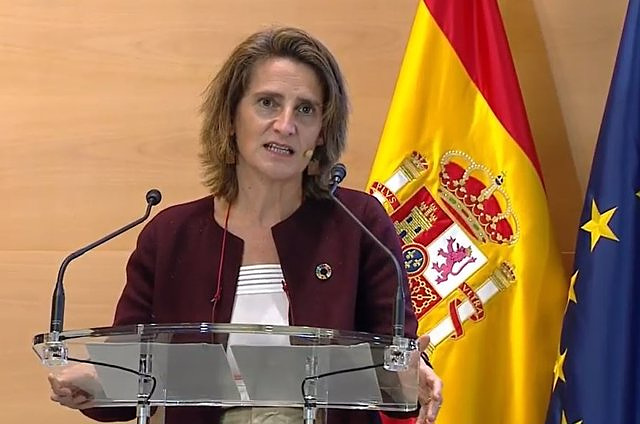MADRID, 31 Ene. (EUROPA PRESS) -
The third vice president of the Government and minister for the Ecological Transition and the Demographic Challenge, Teresa Ribera, has assured that renewable hydrogen, in addition to being conceived as a "common project in Europe", is perceived in Spain as "a train that does not "It must be allowed to pass through geographical, logistical, infrastructure, human and corporate capabilities, and institutional and regulatory context conditions."
At the inauguration of the II Hydrogen Day organized by Enagás, Ribera indicated that hydrogen is an issue that "has been worked on for years" and that represents for Spain "a great economic, energy, industrial, social and environmental opportunity, but also as a great opportunity to build a common project". "It's something we shouldn't let go," he said.
Likewise, he pointed out that, although a goal is planned for 81% of electricity to be produced from renewable sources, hydrogen will also achieve "a leading presence" to decarbonize those options "in which electricity is not enough".
"Having hydrogen capacities gives solvency to the electrical system and having this renewable capacity gives solvency to the perspective of a hydrogen economy," he said.
Within this industrial opportunity that hydrogen represents, Ribera pointed out that the National Integrated Energy and Climate Plan (PNIEC) "increases ambition and updates the objectives" to 11 gigawatts (GW) by 2030, compared to the four contemplated in the previous version. .
In addition, he highlighted the "important" steps in regulatory matters that have been taken to pave the way for the commitment to hydrogen to become a reality, such as the assignment to Enagás to act as provisional operator responsible for presenting a skeleton proposal. hydrogen transportation backbone network for the country or the system of guarantees of origin that provides added value to renewable hydrogen compared to gases of fossil origin, among others.
However, Ribera highlighted that this work "has only just begun" and this scenario must continue to be shaped to promote hydrogen and also design hydrogen transport networks.
"It is something fundamental that can only be done on the basis of collaboration, cooperation between administrations, regulators and companies, professional companies with a long tradition and knowledge in this field," he added in this regard.
In this regard, he indicated that the "priority in these months" will be to work on the transposition of the hydrogen directive and the rest of the regulations, the Fit for 55 package, "which has not yet been incorporated into our national regulatory reality." , said.
For his part, the president of Enagás, Antonio Llardén, stressed that hydrogen will play "a key role" in the decarbonization process as an "autochthonous and autonomous vector."
"It will play from an investment and technological development point of view and it also has great power to transform our industry and to contribute to the reindustrialization of Europe, in addition to also being an opportunity for the Iberian Peninsula, for Spain and for Portugal" , said.
Likewise, Llardén considered that to achieve zero net emissions one cannot "only play the electrification card", which is why he stated that hydrogen "is no longer combined in the future, but in the present."
Meanwhile, the executive vice president of the European Commission, Maros Sefcovic, highlighted the need for the Old Continent to ensure a decarbonized future, something that "will be achieved thanks in part to hydrogen."
In this regard, he indicated that without the right infrastructure at the right time, "the enormous promise that renewable hydrogen represents will never be fulfilled."

 Exploring Cardano: Inner Workings and Advantages of this Cryptocurrency
Exploring Cardano: Inner Workings and Advantages of this Cryptocurrency Seville.- Economy.- Innova.- STSA inaugurates its new painting and sealing hangar in San Pablo, for 18 million
Seville.- Economy.- Innova.- STSA inaugurates its new painting and sealing hangar in San Pablo, for 18 million Innova.- More than 300 volunteers join the Andalucía Compromiso Digital network in one month to facilitate access to ICT
Innova.- More than 300 volunteers join the Andalucía Compromiso Digital network in one month to facilitate access to ICT Innova.-AMP.- Ayesa acquires 51% of Sadiel, which will create new technological engineering products and expand markets
Innova.-AMP.- Ayesa acquires 51% of Sadiel, which will create new technological engineering products and expand markets STATEMENT: ELFBAR and LOST MARY reveal progress in the fight against illicit vapers (1)
STATEMENT: ELFBAR and LOST MARY reveal progress in the fight against illicit vapers (1) STATEMENT: ELFBAR and LOST MARY reveal progress in the fight against illicit vapers (2)
STATEMENT: ELFBAR and LOST MARY reveal progress in the fight against illicit vapers (2) The PSOE is holding a Federal Committee this Saturday that will serve to close ranks with Sánchez so that he does not resign
The PSOE is holding a Federal Committee this Saturday that will serve to close ranks with Sánchez so that he does not resign The Ibex 35 closes the week at its highest since 2015 and is already looking at 11,200
The Ibex 35 closes the week at its highest since 2015 and is already looking at 11,200 How Blockchain in being used to shape the future
How Blockchain in being used to shape the future Not just BTC and ETH: Here Are Some More Interesting Coins Worth Focusing on
Not just BTC and ETH: Here Are Some More Interesting Coins Worth Focusing on UPV students build a prototype of a wooden house to move to Equatorial Guinea
UPV students build a prototype of a wooden house to move to Equatorial Guinea The UA opens the call for the Impulso 2024 Awards for the best innovative business initiatives
The UA opens the call for the Impulso 2024 Awards for the best innovative business initiatives ALI, virtual assistant from Alicante, internationally recognized by the OECD
ALI, virtual assistant from Alicante, internationally recognized by the OECD Retrópolis brings the golden age of video games and computing to the UPV
Retrópolis brings the golden age of video games and computing to the UPV A million people demonstrate in France against Macron's pension reform
A million people demonstrate in France against Macron's pension reform Russia launches several missiles against "critical infrastructure" in the city of Zaporizhia
Russia launches several missiles against "critical infrastructure" in the city of Zaporizhia A "procession" remembers the dead of the Calabria shipwreck as bodies continue to wash up on the shore
A "procession" remembers the dead of the Calabria shipwreck as bodies continue to wash up on the shore Prison sentences handed down for three prominent Hong Kong pro-democracy activists
Prison sentences handed down for three prominent Hong Kong pro-democracy activists ETH continues to leave trading platforms, Ethereum balance on exchanges lowest in 3 years
ETH continues to leave trading platforms, Ethereum balance on exchanges lowest in 3 years Investors invest $450 million in Consensys, Ethereum incubator now valued at $7 billion
Investors invest $450 million in Consensys, Ethereum incubator now valued at $7 billion Alchemy Integrates Ethereum L2 Product Starknet to Enhance Web3 Scalability at a Price 100x Lower Than L1 Fees
Alchemy Integrates Ethereum L2 Product Starknet to Enhance Web3 Scalability at a Price 100x Lower Than L1 Fees Mining Report: Bitcoin's Electricity Consumption Declines by 25% in Q1 2022
Mining Report: Bitcoin's Electricity Consumption Declines by 25% in Q1 2022 Oil-to-Bitcoin Mining Firm Crusoe Energy Systems Raised $505 Million
Oil-to-Bitcoin Mining Firm Crusoe Energy Systems Raised $505 Million Microbt reveals the latest Bitcoin mining rigs -- Machines produce up to 126 TH/s with custom 5nm chip design
Microbt reveals the latest Bitcoin mining rigs -- Machines produce up to 126 TH/s with custom 5nm chip design Bitcoin's Mining Difficulty Hits a Lifetime High, With More Than 90% of BTC Supply Issued
Bitcoin's Mining Difficulty Hits a Lifetime High, With More Than 90% of BTC Supply Issued The Biggest Movers are Near, EOS, and RUNE during Friday's Selloff
The Biggest Movers are Near, EOS, and RUNE during Friday's Selloff Global Markets Spooked by a Hawkish Fed and Covid, Stocks and Crypto Gain After Musk Buys Twitter
Global Markets Spooked by a Hawkish Fed and Covid, Stocks and Crypto Gain After Musk Buys Twitter Bitso to offset carbon emissions from the Trading Platform's ERC20, ETH, and BTC Transactions
Bitso to offset carbon emissions from the Trading Platform's ERC20, ETH, and BTC Transactions Draftkings Announces 2022 College Hoops NFT Selection for March Madness
Draftkings Announces 2022 College Hoops NFT Selection for March Madness























